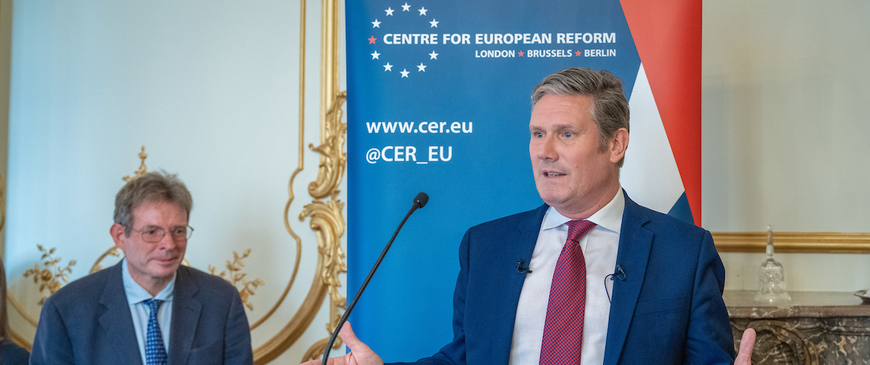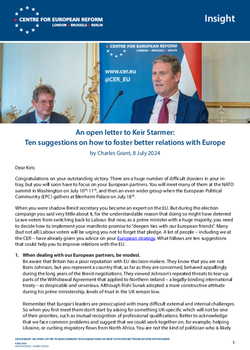
An open letter to Keir Starmer: Ten suggestions on how to foster better relations with Europe
Dear Keir,
Congratulations on your outstanding victory. There are a huge number of difficult dossiers in your in-tray, but you will soon have to focus on your European partners. You will meet many of them at the NATO summit in Washington on July 10th-11th, and then an even wider group when the European Political Community (EPC) gathers at Blenheim Palace on July 18th.
When you were shadow Brexit secretary you became an expert on the EU. But during the election campaign you said very little about it, for the understandable reason that doing so might have deterred Leave voters from switching back to Labour. But now, as a prime minister with a huge majority, you need to decide how to implement your manifesto promise to “deepen ties with our European friends”. Many (but not all) Labour voters will be urging you not to forget that pledge. A lot of people – including we at the CER – have already given you advice on your European strategy. What follows are ten suggestions that could help you to improve relations with the EU.
1. When dealing with our European partners, be modest.
Be aware that Britain has a poor reputation with EU decision-makers. They know that you are not Boris Johnson, but you represent a country that, as far as they are concerned, behaved appallingly during the long years of the Brexit negotiations. They viewed Johnson’s repeated threats to tear up parts of the Withdrawal Agreement that applied to Northern Ireland – a legally-binding international treaty – as despicable and unserious. Although Rishi Sunak adopted a more constructive attitude during his prime ministership, levels of trust in the UK remain low.
Remember that Europe’s leaders are preoccupied with many difficult external and internal challenges. So when you first meet them don’t start by asking for something UK-specific which will not be one of their priorities, such as mutual recognition of professional qualifications. Better to acknowledge that we face common problems and suggest that we could work together on, for example, helping Ukraine, or curbing migratory flows from North Africa. You are not the kind of politician who is likely to indulge in chest-puffing or boasts about Britain’s ‘world-beating’ this or that – but try and make sure your ministers avoid that kind of behaviour. A period of calm, predictable and constructive diplomacy would do wonders for the UK’s reputation.
2. Be clear about what you want.
In the years after the Brexit referendum, there was often a great lack of clarity about what the UK wanted from the EU – partly because of internal disagreements within Conservative governments. If the British are not clear about what they want, the EU cannot adopt a coherent strategy for dealing with them. Rightly or wrongly, EU governments worry that you and your colleagues are uncertain how you want to improve the UK-EU relationship. Some of them suspect that you do not yet have much of a plan. Hopefully you do, or you will have one soon. You can use the Blenheim meeting of the EPC as an opportunity to set out – in very broad terms – your thinking.
3. Don’t ignore the Brussels institutions.
Both the member-states and the institutions in Brussels (and in Strasbourg and Luxembourg) are important to the way the EU works. Yet successive Conservative governments often sought to minimise contacts with Brussels, preferring to engage with national capitals – because of their dislike of ‘Brussels bureaucrats’, and because the Commission is a hard-to-understand and sometimes inflexible body. Going behind the Commission’s back to try and undermine its position in the Brexit talks may have seemed like a clever tactic, but it never worked. That kind of sneaky behaviour caused annoyance, and not only in Brussels.
Evidently, a Labour government committed to improving the terms of the UK’s relationship with the EU will need to talk to key national capitals as well as people in Brussels, but it is important to do both, since the latter have real power and influence. I don’t think you have shown your face in Brussels since becoming party leader. If you gave a speech there, it would do a lot to demonstrate that, under Labour, the UK is changing. You could also seek an invite to the October meeting of the European Council – to signal a reset to the relationship, and a show of unity before the US presidential election.
4. Start off with a focus on security co-operation.
For all the problems that Britain’s armed forces are currently experiencing, they remain more capable than most in Europe. In these uncertain times, the more that Britain can contribute to European security, the more goodwill that creates among former EU partners. It can contribute via NATO, other bodies such as the Joint Expeditionary Force, bilateral ties on the model of the Lancaster House treaties with France, or even the EU itself.
The EU has always wanted close post-Brexit security co-operation with the British, and was upset when Johnson scrapped plans to work together on foreign and defence policy. The Trade and Co-operation Agreement (TCA) is very thin in these areas; countries such as the US, Canada and Norway have more structured ties with the EU on foreign and defence policy than does the UK. So it is a good thing that your new foreign secretary, David Lammy, and your new defence secretary, John Healey, are calling for a ‘security pact’ with the EU, even though not much has been said about its contents. Former foreign minister David Miliband has suggested that the security pact could take the form of a non-binding declaration, which would outline a shared agenda and a roadmap for deepening relations. In the longer term most member-states would not object to the creation of structures that would allow the UK to chip in its thoughts on foreign policy – whether at meetings of officials, ministers or heads of government – on a regular basis.
Theresa May made a mistake in her Lancaster House speech of January 2017 when she more-or-less said that because Britain contributed so much to European security, it deserved a good trade deal. Such linkage was counter-productive; our allies know that their security is our security too. Nevertheless, close defence and security co-operation with the EU and individual member-states would create warmer feelings towards the UK, which could well help when trade issues are discussed.
5. Don’t be deterred from trying to improve the trading relationship with the EU.
While European leaders will say they want a security pact, some of them will advise you not to reopen the UK-EU trading relationship. They will tell you that the TCA works well for them and that they are very busy with a host of other problems. Revisiting that deal with the British – which they found a nightmare to negotiate – is not in their top 20 priorities, according to many French, German and Commission officials.
But you should not be deterred from trying to improve the disappointing trade deal that Johnson signed with the EU. As businesses keep telling you, it is damaging Britain’s growth prospects. For example, manufacturers – especially small firms – say that paperwork and friction at the border deter them from exporting, while services firms – such as consultancies – complain that they are hurt by their inability to send staff to the EU for a few days without a visa. The Office of Budget Responsibility reckons the Brexit deal has cost the UK 4 per cent of its GDP, while the CER’s own economists put the loss at 5.5 per cent. You should frame your attempt to improve the trading relationship as an integral part of your government’s growth strategy. You can keep to your red lines – no single market, no customs union and no freedom of movement – while still forging a closer and better deal with the EU.
6. Be ready to bargain with the EU.
Don’t be put off by what will be an initially frosty reaction to any attempt to reopen the trading relationship. In fact, the UK has allies in the EU who would like closer ties, including on trade. The Nordics, Baltics and Poles are among them. And this recent comment from a Spanish official is quite typical of how some of the others think: “We would start with the French line and say no to reopening. But that could be just a starting position. Changing the TCA is not urgent for us, but if it was important for the UK we could look at it again.” If a Labour government can prove itself trustworthy and reasonable to deal with, more governments will come round to that point of view.
It would also help if you surprised on the upside in what you offer the EU. Remember that you have not defined either alignment with EU rules or accepting a role for the European Court of Justice (ECJ) as red lines. You have already proposed a veterinary deal with the EU, which would reduce border friction for plants, animals and food, and involve ‘dynamic alignment’ (constant updating) with EU rules, and probably some role for the ECJ. Why not propose dynamic alignment in other areas too, such as energy? That would delight businesses which hate having to deal with two sets of rules.
Some on the EU side would then say “no cherry-picking”: the single market is an integrated whole and being in bits of it is not allowed. But in fact the EU wants to pick a few cherries of its own: it needs a deal on fish after the current arrangements expire in 2026, it wants an agreement on youth mobility and it would like the UK to rejoin the Erasmus student exchange scheme. The EU will do what is in its self-interest and expects some give-and-take. You should be ready to bargain with the EU over quid pro quos. If enough governments want to change the trading relationship with the UK, the European Council will give the Commission a new mandate to do just that.
7. Demonstrate that you are strong enough to stand up to attacks by hard-line eurosceptics.
EU leaders worry that a Labour government could start off by being ‘pro-European’ but then be blown off course by the force of the eurosceptic media, as previous British governments have been. These worries may limit the EU’s ambitions in negotiating new arrangements with the British: what would be the point of seeking an ambitious deal if the UK then retreats from it a few years later? The fact that you said rather little about the EU during the general election campaign reinforced concerns that the likes of the Daily Mail may be able to push your government around.
The language surrounding the mobility of workers and young people may be a test. Everyone knows that you oppose free movement of people between the EU and the UK, in the sense of the right to permanently work in another country with few conditions or restrictions. But that is not the same as mobility, in the sense of someone crossing the Channel for a few days to fulfil a contract. Labour politicians have in the past talked about the need to add a mobility chapter to the TCA, but not recently, presumably in case it sounds like freedom of movement. If you stick to your guns on mobility and show that the tabloids cannot cow you, it will do wonders for your reputation in EU capitals.
8. Rebuild expertise on the EU.
One unfortunate consequence of Brexit has been a great loss of EU expertise within the UK. Ministers and officials no longer travel regularly to Brussels, Luxembourg and Strasbourg, for sessions with their EU counterparts. Within the British government, the number of officials who know how the EU works, or who maintain good contacts in continental capitals, diminishes year by year. The Foreign, Commonwealth and Development Office (FCDO) is a particular problem. In the years following the Brexit referendum, ministers intervened in appointments to stymie the careers of those perceived to be sympathetic to, or expert on, the EU, and to help those considered more eurosceptic. The FCDO had trained a strong cadre of EU experts, but many are now working on other things.
Even though Britain has left the EU, its government still needs experts who understand it. In rebuilding expertise, your government should engage with businesses, think-tanks and universities, where pockets of relevant knowledge and experience still exist. Officials in the FCDO and other departments should be encouraged to learn about the EU – and sometimes be seconded to European ministries and to the EU institutions, as are US and other third-country diplomats (such schemes should work in both directions).
9. Be aware that in the long term, the geopolitical context will do a lot to colour UK-EU relations.
The world is a much darker place than it was at the time of the June 2016 Brexit referendum. Russia has re-emerged as a military threat to Europe. China’s economic, diplomatic and military clout has dramatically increased. The US has elected Donald Trump once and may soon choose him a second time. Covid made everyone feel insecure. Global efforts to combat climate change are faltering. Protectionism is on the rise. Far-right parties are thriving in parts of the continent and in the UK. The case for like-minded countries co-operating has seldom been stronger.
Most EU countries will want to draw the UK closer – especially if Trump serves a second term – while understanding that Brexit is not reversible for a generation. So, as long as the UK behaves responsibly and contributes to European security, in the long run the EU will see mutual self-interest in closer ties, including in economics.
The example of China illustrates how economic policy and security policy are converging. There are different views within the EU on China, but its centre ground is close to UK thinking: both want to be able to criticise Beijing for abusing human rights, bullying neighbours and supporting Russia’s war effort, but also to work with China on trade, climate and pandemics. The US, less dependent than Europe on trade with China, is focused on slowing its economic and military development. It will put enormous pressure on its European allies, the UK included, to take a harder stance towards Beijing, for example by blocking the transfer of advanced technologies. There are no easy answers on what to do about China, but the UK and the EU countries face similar dilemmas and share similar interests. They will be stronger when they collaborate.
10. Don’t forget to bring the British people with you.
Whatever strategy you pursue for improving relations with the EU, make sure you take the British people with you. In recent decades – when we were in the EU and since we left – very few British politicians have made much effort to explain the benefits of working together with European partners. They felt it was too much hard work, and likely to incur the wrath of the eurosceptic press. That is presumably why Tony Blair, though in many ways a pro-EU politician, made virtually none of his great speeches about Europe on UK soil. But the dangers of such an approach became evident in the referendum campaign: then Prime Minister David Cameron urged the British people to vote Remain, but since he had spent his entire period in office knocking the EU, his argument was unconvincing.
We understand why you said very little about the EU during the election campaign. But in the long run you will have to abandon the omertá about Europe. If Britain’s political leaders do not seek to explain the benefits of European co-operation, they will leave fertile ground for eurosceptics to exploit. For the likes of Nigel Farage, the anti-EU war is ceaseless. If we are in the EU they want us out, and if we are out they want to diminish ties. Britain’s pro-Europeans, yourself included, have a responsibility to make the case for constructive co-operation with other Europeans.
With best wishes, and good luck for your prime ministership.

Charles Grant
Director, CER




Comments
In the light of these developments, I believe that it is wrong, and unintentionally disrespectful to the British public, to write about Brexit not being reversible for a generation. It, additionally, does not respect the one million people who marched through London in the summer of 2019 in support of remaining in the EU. On a more practical note, it was recently reported on the BBC radio that the national debt that the Labour Government inherited was not far short of our nation’s total GDP (which when I last checked was in the region of £2.2 Trillion). This suggests to me that if our new Government wishes to make serious inroads into our national debt and to meet its numerous obligations, there is a firm economic case for taking positive action towards re-entering the EU in the very near future. One of its earliest actions should be to introduce a sensible new PR electoral system and, in so doing, protect the UK from future Brexiteer minority Governments. I understand that some European leaders may have other ideas about the UK’s re-entering the EU, but they, and a section of the British public, need to understand that Brexit was in essence an outrageous con; the biggest and most damaging con that has ever been perpetrated against the citizens of the UK.
Add new comment